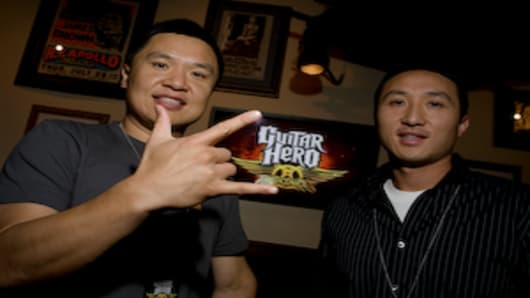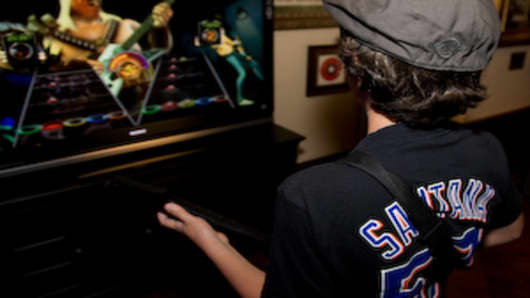Red, Green, Red. Green, Blue. Yellow! By mastering this and other color-coordinated patterns, any gamer can be Joe Perry, via a plastic guitar, that is.
"Guitar Hero: Aerosmith," Activision's latest installment of their video game franchise, launched Friday at Time Square's Hard Rock Cafe release party in New York. It's the fourth game in the best-selling title, but the first based on a specific band.
Aerosmith jumped at the opportunity to be a part of the record-breaking franchise, which has sold more than $1.3 billion since the first version premiered in 2005.
“The Activision guys took it to another level with this one. We’re proud to be a part of it,” Aerosmith bassist Brad Whitford said at Friday's launch party.
“It was like breaking new ground,” added Joe Perry, the band's own featured guitar hero. "It was fascinating to see it all come together.”
During the game's creation, band members spent two weeks performing in a motion capture studio in order for their video game figures to move exactly as the group performs on stage.
Available in stores June 29, the game features 30 of the band's most notable hits such as "Love in an Elevator" and "Sweet Emotion." It also includes songs from various artists Aerosmith performed and collaborated with over the years, including Run D.M.C.'s "Walk This Way" and "I Hate Myself for Loving You" by Joan Jett.
There is even a special guitar controller emblazoned with the band's red and white logo for hard core fans.
The game and guitar controller bundle for Microsoft's Xbox 360, Sony's PlayStation3 and Nintendo's Wii sells for $99.99, with an additional PlayStation2 version for $89.99. The game is also sold individually for each of the consoles and costs $59.99 and $49.99, respectively.
While the Aerosmith game is the first Guitar Hero edition that focuses on an individual rock band, the previous three versions of the game featured various rock music genres that ranged from grunge, classic rock, metal, punk and '80s hits.
Activision acquired Guitar Hero in 2006 from the Huang Brothers, founders of the development company Red Octane, for $100 million. Before the acquisition, the Huang brothers were struggling to find investors and took out mortgages to finance their budding idea.
“I was saying to my wife, ‘I think we should take all the money we have and put it into this game Guitar Hero.’ Now it’s obvious to the world,” Charles Huang joked.
When Activision provided the resources to take their creation to an ever-expanding market, the several subsequent releases made Guitar Hero the No. 1 video-game franchise within a single year.
“People always told us video games is a hit-driven industry. We didn’t know what that meant until we had a hit," Huang said. "We didn’t expect it on this scale. This is insane.”
Before Guitar Hero became what it is today, bands were apprehensive about attaching their songs to an unknown game. A few short years later, bands are itching to be included. However, the Aerosmith discography is exclusive to Activision (with the exception of the single Aerosmith song on Rock Band), leaving some gamers concerned over the future of virtual rock stardom.
“I think it’s way the market is going. We’re trying to lock down the best partners we can to make a great game,” Doug McCracken, global marketing brand manager for Activision said.
Activision also is set to come out with a Metallica Guitar Hero edition in 2009, further polarizing the song libraries between Guitar Hero and their top competitor, "Rock Band."
“I think that it’s great for the music game as a category," Kai Huang said of the competition. "The more players there are in this space, the more people are going to know what [the Guitar Hero brand] is. Overall, it’s going to continue to grow.”
The company also will release "Guitar Hero: World Tour" during the Christmas season, which will include a drum set and microphone in addition to the guitar controller, rivalling "Rock Band," produced by Viacom's MTV unit and Electronic Arts .




